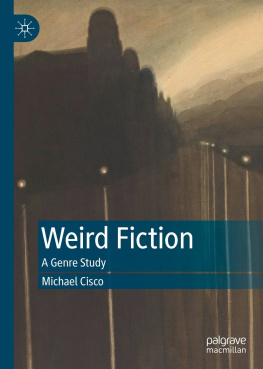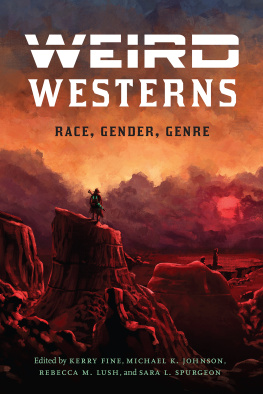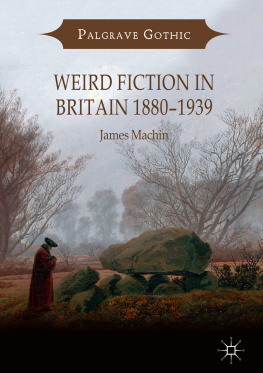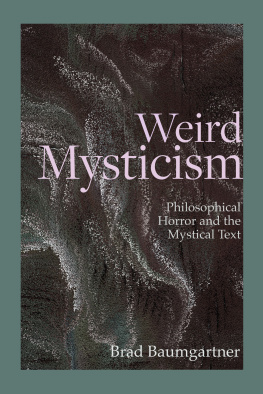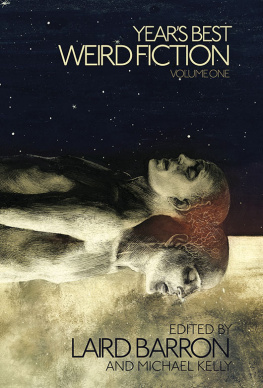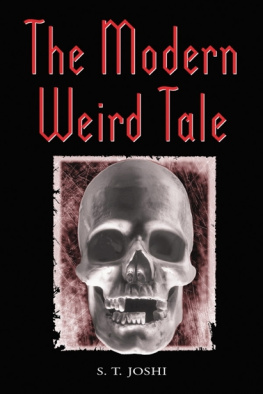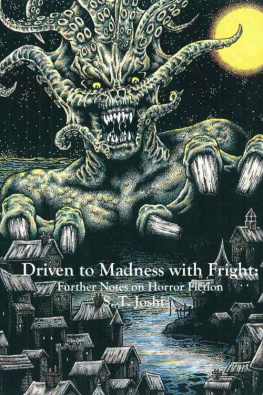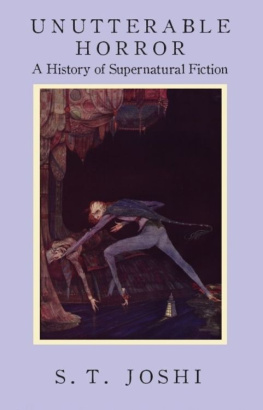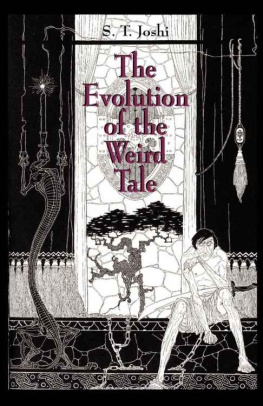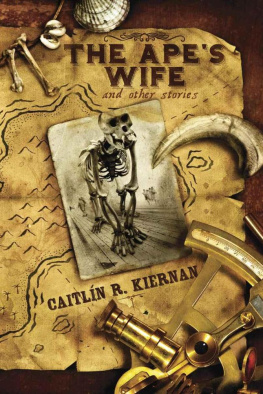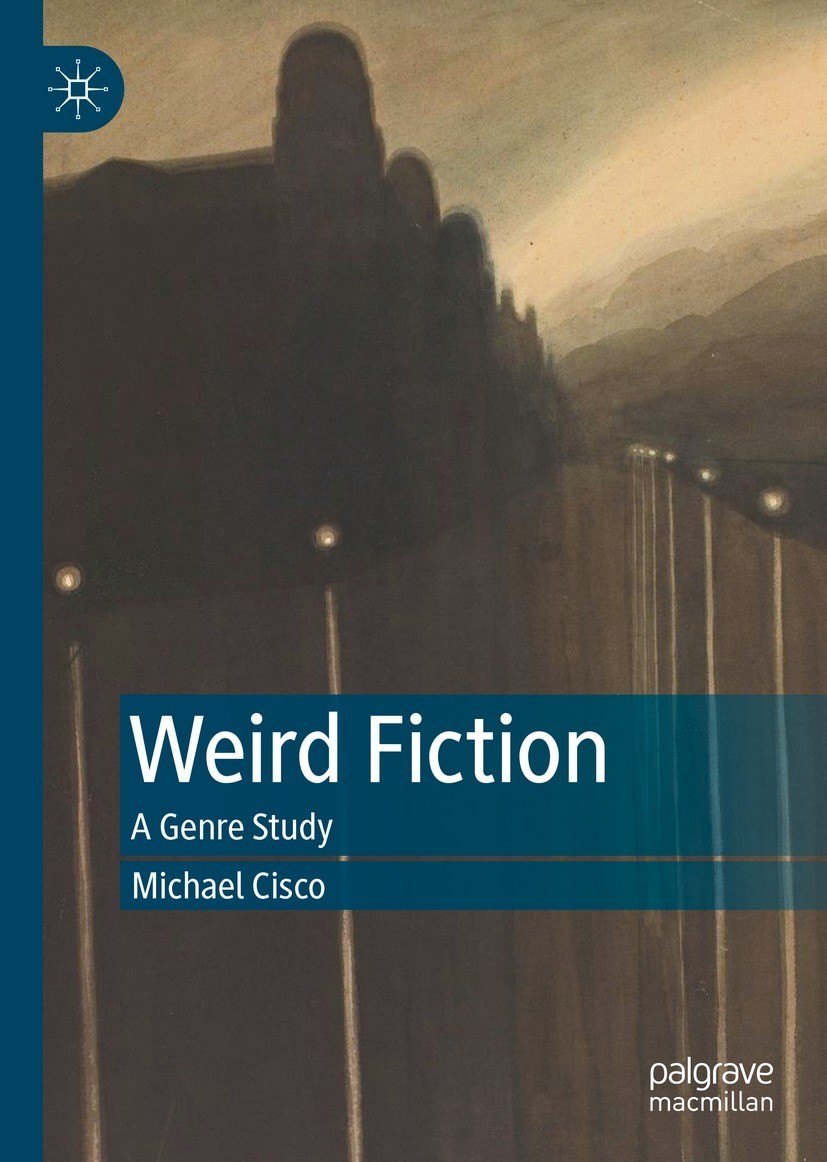Michael Cisco
Weird Fiction
A Genre Study

Logo of the publisher
Michael Cisco
CUNY Hostos Community College, Bronx, NY, USA
ISBN 978-3-030-92449-2 e-ISBN 978-3-030-92450-8
https://doi.org/10.1007/978-3-030-92450-8
The Editor(s) (if applicable) and The Author(s), under exclusive license to Springer Nature Switzerland AG 2021
This work is subject to copyright. All rights are solely and exclusively licensed by the Publisher, whether the whole or part of the material is concerned, specifically the rights of translation, reprinting, reuse of illustrations, recitation, broadcasting, reproduction on microfilms or in any other physical way, and transmission or information storage and retrieval, electronic adaptation, computer software, or by similar or dissimilar methodology now known or hereafter developed.
The use of general descriptive names, registered names, trademarks, service marks, etc. in this publication does not imply, even in the absence of a specific statement, that such names are exempt from the relevant protective laws and regulations and therefore free for general use.
The publisher, the authors and the editors are safe to assume that the advice and information in this book are believed to be true and accurate at the date of publication. Neither the publisher nor the authors or the editors give a warranty, expressed or implied, with respect to the material contained herein or for any errors or omissions that may have been made. The publisher remains neutral with regard to jurisdictional claims in published maps and institutional affiliations.
Cover illustration: Heritage Image Partnerships Ltd / Alamy Stock Photo
This Palgrave Macmillan imprint is published by the registered company Springer Nature Switzerland AG
The registered company address is: Gewerbestrasse 11, 6330 Cham, Switzerland
Contents
The Author(s), under exclusive license to Springer Nature Switzerland AG 2021
M. Cisco Weird Fiction https://doi.org/10.1007/978-3-030-92450-8_1
1. Genre and Judgement
Michael Cisco
(1)
CUNY Hostos Community College, Bronx, NY, USA
In The Law of Genre, Jacques Derrida and Avital Ronell define genre as an exclusive category ; that is, genre is defined by the fact that it must shut something out. The chapter opens with this observation : As soon as the word genre is sounded a limit is drawn. And when a limit is established, norms and interdictions are not far behind: Do, Do not says genre My folly ensues below.
The first thing to note here, before going further, is that when Derrida and Ronell speak of genre , they are following Genette and speaking of the differences between novels and short stories, plays and poems. Weird fiction is not a genre the way a novel is a genre , since we will include in the genre of weird fiction examples drawn from short stories and novels, poetry, plays, and screenplays; so there is already a bit of a mismatch between these two uses of the term genre . While Derrida and Ronell invert the more familiar, inclusive idea of genre , they dont innovate in genre studies so much as they send us down a cul-de-sac, by defining genre negatively. The resulting definition is likely to be only whatever remains after performing all the genres exclusions, which was, perhaps, the point, since a definition also excludes possibilities. What is excluded from this definition of genre is an accounting for that exclusionary activity itself, which would necessarily address the appeal of a genre . Our definition of genre here is liable to do the same if were not careful to draw a general inclusion, such that the idea of genre remains open and dynamic, operating productively in terms of a selection. What is genre , positively speaking? What is it that selects which differences matter?
Deleuze and Guattari , among other post-structuralist thinkers, complicate any territorial concept of definition. The difficulty is not that there is a territory established, since this is impossible to avoid: territories maintain themselves through our various logics and grammars. The difficulty is that art is constantly deterritorializing; in other words, it isnt the same thing over and over, even if the each work of art is consistent with other works of art. Art persists through time as art by repeating, but not by repeating the same particular works of art. Instead, art exists in a condition of constant reinvention, albeit with ongoing relationships to established art, and so genre definitions are always more or less behind the times. Definitions are hard to make because they want to be able to predict the future, or even to judge the present, but so often they are basically only descriptions of what has usually been done up to now. Genre in fiction may posit a sort of model story, a transcendent one that we never actually read, but which seems to stand behind any given example. However, it is better to say that the model story is an aggregate of existing stories, coming about after the fact, rather than the cause of these actual stories. A weird tale may be written in keeping with such an aggregate model, but it is important to understand that this model is not fixed or determinative; in fact, the genre waits for stories that are very different. The genre then is not a transcendent identity , but a virtuality that is concretely immanent to weird fiction, which is an elaborate way of saying that the genre is in all the stories written to date; it is the selection that gathers certain stories into certain canons for certain readers and writers. We may come up with a checklist of common tropes in weird fiction; this is not a waste of time, but it is not the whole story, either, since such a list isnt going to help us to understand the selections that produced it. So, this study will address the concept that guides the selection of what we call weird fiction.
The end result still involves collecting various stories and grouping them as weird fiction. The difference, however, is that these stories are selected because they are germ cultures, which generate more stories. In this way, the productive aspect of weird fiction as a genre can be studied and we can understand that the genre exclusion process is part of larger productive process.
Instead of thinking of a canon in terms of provisionally fixed genre boundaries, this approach will think of canonizations; whenever a certain culture of weird fiction develops, it organizes its own canon, and as new kinds of weird fiction are created, new canons arise and old ones adjust. Coming up with a concept of weirdness will not only make an understanding of the genre easier, it will also mean we can establish connections with works not considered weird fiction without being compelled to claim them for the genre , to the exclusion of other genres .
The point of all this is to see if we can have done with judgement, in keeping with the recommendations of Deleuze and Guattari . That is to say, we are throwing away the cookie cutters of genre analysis. What would a genre study that has done with judgement look like? And would it make any difference? Would it entail a judgement banishing general conclusions?

